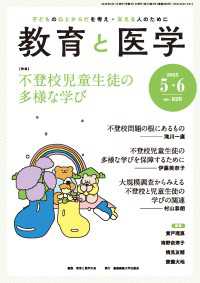- ホーム
- > 洋書
- > 英文書
- > Politics / International Relations
基本説明
New in paperback. Hardcover was published in 2004. Examining vital aspects of the transitional decade and the comparative lessons learned.
Full Description
This collection of essays is the result of a conference convened at Princeton University marking the ten-year anniversary of the collapse of the Soviet Union. Some of the best minds in post-Soviet studies focused on the task of identifying in what ways the post-Communist experience with transition has confirmed or confounded conventional theories of political and economic development. The result is a rich array of essays examining vital aspects of the transitional decade following the Soviet collapse and the comparative lessons learned. These essays explicitly tally the gains and losses to post-Soviet countries of the last ten years as well as comparing the post-Soviet experience implicitly and explicitly with that of other developing countries. Each essay blends political science theory with fresh empirical analysis.
Contents
Contributors; Introduction: the evolving social science of post Communism Michael McFaul and Kathryn Stoner-Weiss; 1. The triumph of Nation-States: lessons from the collapse of the Soviet Union, Yugoslavia, and Czechoslovakia Philip Roeder; 2. The fourth wave of democracy and dictatorship: noncooperative transitions in the post-Communist world Michael McFaul; 3. Circumstances versus policy choices: why has the economic performance of the Soviet successive states been so poor? Vladimir Popov; 4. Whither the Central State? The regional sources of Russia's stalled reforms Kathryn Stoner-Weiss; 5. Parties, citizens, and the prospects for democratic consolidation in Russia Timothy Colton; 6. Comparative democratization: lessons from Russia and the post-Communist World Valerie Bunce; 7. Russians as joiners: realist and liberal conceptions of post-Communist Europe James M. Goldgeier and Michael McFaul; Index.








